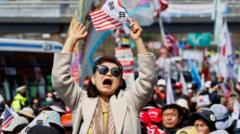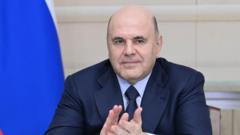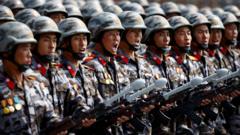South Korea's Constitutional Court has unanimously upheld the impeachment of President Yoon Suk Yeol, raising significant questions about the future of the nation's democracy and political integrity.
South Korea's President Impeached: Political Fallout and Upcoming Elections

South Korea's President Impeached: Political Fallout and Upcoming Elections
The nationwide impact of Yoon Suk Yeol’s impeachment on South Korea’s political landscape.
In a historical and contentious ruling, South Korea’s Constitutional Court has formally removed President Yoon Suk Yeol from office, following a unanimous vote that underscored the serious repercussions of his controversial martial law declaration last December. Suspended since then, Yoon’s impeachment was celebrated by some and mourned by others, fueling an already divided national sentiment.
Public reaction was immediate, with gatherings across Seoul as citizens watched the verdict unfold on live broadcasts. For many, the decision represented a necessary step in restoring the tenets of democracy, especially after Yoon's brief and alarming attempt at military control, which rattled the nation and reminded many of South Korea's turbulent past.
Moon Hyung-bae, the acting president of the court, harshly criticized Yoon's actions, stating his military strategy was unjustified and highlighted a failure to protect the democratic rights of the people. With the verdict comes a call for a snap election that must occur by June 3, allowing South Korea to select a new leader.
Despite the ruling, Yoon's legacy remains contentious. He has not shown remorse for his actions, instead framing himself as a victim of a corrupt political landscape, which has only deepened societal divisions. His rhetoric has begun to echo in more radical circles, as a considerable portion of the population remains disillusioned with the mainstream political process. Protests have become a regular occurrence, reflecting a polarized society grappling with trust in its institutions.
With only about 60 days until a new election, the atmosphere is fraught—marked by skepticism toward the electoral system and fears that the national divisions will impact voter acceptance of the results. Observers stress the importance of unity and healing, urging citizens to move beyond past grievances and work towards a more stable political future.
Looking ahead, the new leader will not only need to address internal challenges but also navigate fraught diplomatic tensions with the U.S. and North Korea, particularly under President Trump, who has already leveled economic tariffs that threaten South Korea's economic stability. As the nation prepares for significant transition, all eyes will be on the upcoming election and the candidates vying for the position of leadership in a country polarized by recent events.
Yoon cannot appeal the impeachment ruling as it comes from the highest court, but he may resist leaving quietly, as his political party appears eager to concede and move forward. The next few weeks are critical for South Korea, as both political consolidation and restoration of trust are needed to steer the country towards a unified future amidst an ongoing crisis.
Public reaction was immediate, with gatherings across Seoul as citizens watched the verdict unfold on live broadcasts. For many, the decision represented a necessary step in restoring the tenets of democracy, especially after Yoon's brief and alarming attempt at military control, which rattled the nation and reminded many of South Korea's turbulent past.
Moon Hyung-bae, the acting president of the court, harshly criticized Yoon's actions, stating his military strategy was unjustified and highlighted a failure to protect the democratic rights of the people. With the verdict comes a call for a snap election that must occur by June 3, allowing South Korea to select a new leader.
Despite the ruling, Yoon's legacy remains contentious. He has not shown remorse for his actions, instead framing himself as a victim of a corrupt political landscape, which has only deepened societal divisions. His rhetoric has begun to echo in more radical circles, as a considerable portion of the population remains disillusioned with the mainstream political process. Protests have become a regular occurrence, reflecting a polarized society grappling with trust in its institutions.
With only about 60 days until a new election, the atmosphere is fraught—marked by skepticism toward the electoral system and fears that the national divisions will impact voter acceptance of the results. Observers stress the importance of unity and healing, urging citizens to move beyond past grievances and work towards a more stable political future.
Looking ahead, the new leader will not only need to address internal challenges but also navigate fraught diplomatic tensions with the U.S. and North Korea, particularly under President Trump, who has already leveled economic tariffs that threaten South Korea's economic stability. As the nation prepares for significant transition, all eyes will be on the upcoming election and the candidates vying for the position of leadership in a country polarized by recent events.
Yoon cannot appeal the impeachment ruling as it comes from the highest court, but he may resist leaving quietly, as his political party appears eager to concede and move forward. The next few weeks are critical for South Korea, as both political consolidation and restoration of trust are needed to steer the country towards a unified future amidst an ongoing crisis.



















